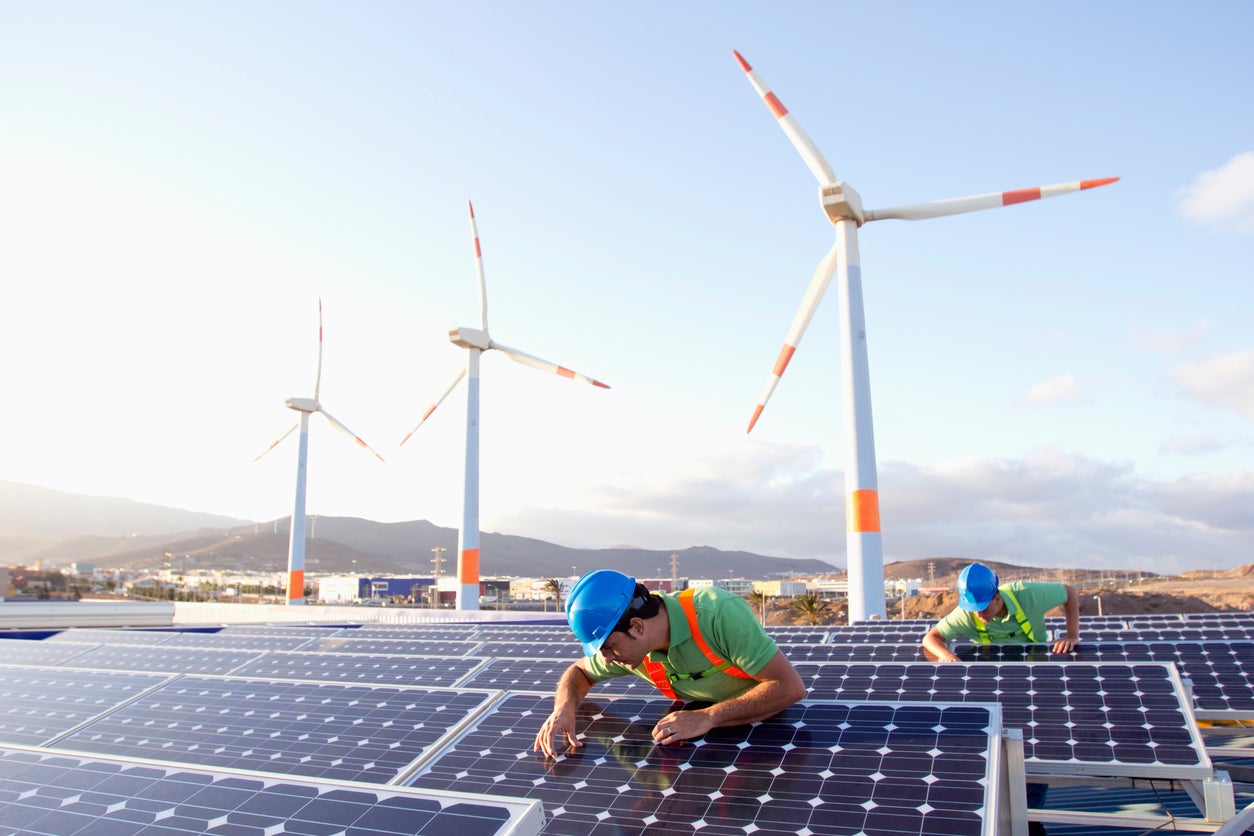
The US’s landmark Inflation Reduction Act looks set to be approved tomorrow (12 August), representing one of the biggest investments in emissions reductions and sustainable energy in history.
It includes support for a swathe of both emerging and established low-carbon technologies, making each significantly cheaper to produce and buy. These include solar panels, wind turbines, batteries, heat pumps and electric vehicles (EVs), as well as green hydrogen, carbon capture and small nuclear reactor technology.
Taken together, analysts predict the measures will slash the US’s carbon emissions by 40% and “kickstart the era of affordable clean energy in America”. But the $369bn (£300bn) package could also boost the burgeoning clean technology sector across the pond, not least by opening up a huge new market.
“When the US goes big on something, it has a massive impact elsewhere,” says Caroline Hargrove, who is CTO at Ceres, a British fuel cell and hydrogen engineering company that partners with companies in hard-to-decarbonise industries such as steel manufacturing.
“It will give confidence to international companies to develop [green technology] in the US and then apply what worked there elsewhere, which is why we’re so excited.”
Although many of the act’s subsidies are geared towards supporting American businesses, Sam Alvis, head of economy at think tank Green Alliance, says US green supply chains are still underdeveloped. “At least for the first few years, there will be opportunities to help companies bridge those supply chain, in particular in technologies like heat pumps, where the US is much further behind than Europe.”
Manufacturers across the UK and Europe are preparing to boost their US operations in anticipation of vastly increased demand. “The US will be the leading energy storage market globally,” one Norwegian battery firm tells Sifted, while UK power giant Drax says the bill will allow it to accelerate its carbon capture business in the US.
So much money flooding into the sector will produce “innovation spill-over effects” as manufacturers ramp up R&D spending, Alvis says. “If the US massively lowers the cost of producing batteries and clean energy, and of making EVs, then that’s going to benefit all its allies and trading partners and allow us to innovate further.”
Providing a long-term clean energy plan
In contrast to what’s been dubbed the ‘solar coaster’ – in which American solar power subsidies fluctuated dramatically year-to-year, ham-stringing the industry – many of the tax credits included in the act will run for a decade or more. This will provide vital reassurance to investors hoping to fund early-stage businesses or projects that might take decades to pay off.
“We need to trust that these technologies [will] mature and get cheaper, but unless you give long-term incentives and people feel they can commit, it’s hard,” Hargrove says.
She also praises the act’s support for multiple technologies, which is needed to build up a new energy system. For instance, Ceres’s hydrogen technology relies on access to renewable power and long-term energy storage, as well as a market convinced that it is a better option than fossil fuels. “You don’t just replace one item in a current system – you need to build that whole supply chain.”
Although some have criticised the act’s “all carrot and no stick” approach has been criticised for leaving doors open to fossil fuel companies, it may be the smartest way to encourage private investors to follow suit. “Tax credits are a really great way of unlocking private capital,” Alvis says. “It incentivises people to act first and rewards them for acting, rather than trying to push them to act with another mechanism.”
It’s an approach the UK government has already deployed. Rishi Sunak, then the chancellor, brought in a “super deduction” last year that allows companies to claim 130% tax credits on business equipment. If similar measures are focused on clean technology it could be a game-changer, Alvis argues, and potentially more palatable to a Conservative party wary of “hand-outs”.
Most potent of all, though, is the ripple effect potential: when the US makes such an ambitious move, the world still sits up. “This is such a huge signal to other countries - if the biggest emitter per capita is finally doing something, there is no reason for others not to as well,” Alvis says.

The US’s landmark Inflation Reduction Act looks set to be approved tomorrow (12 August), representing one of the biggest investments in emissions reductions and sustainable energy in history.
It includes support for a swathe of both emerging and established low-carbon technologies, making each significantly cheaper to produce and buy. These include solar panels, wind turbines, batteries, heat pumps and electric vehicles (EVs), as well as green hydrogen, carbon capture and small nuclear reactor technology.
Taken together, analysts predict the measures will slash the US’s carbon emissions by 40% and “kickstart the era of affordable clean energy in America”. But the $369bn (£300bn) package could also boost the burgeoning clean technology sector across the pond, not least by opening up a huge new market.
